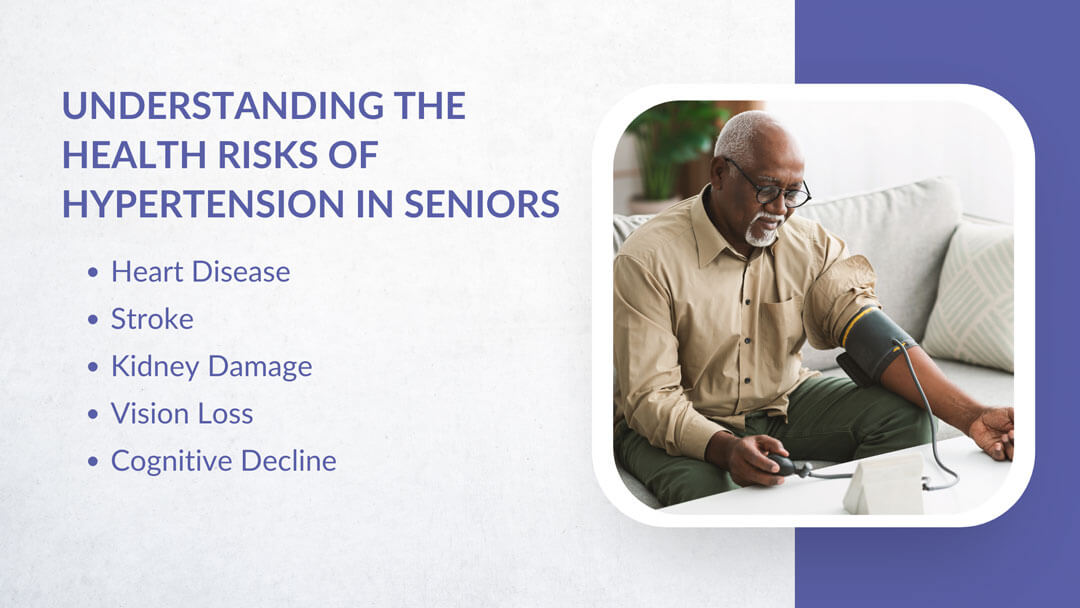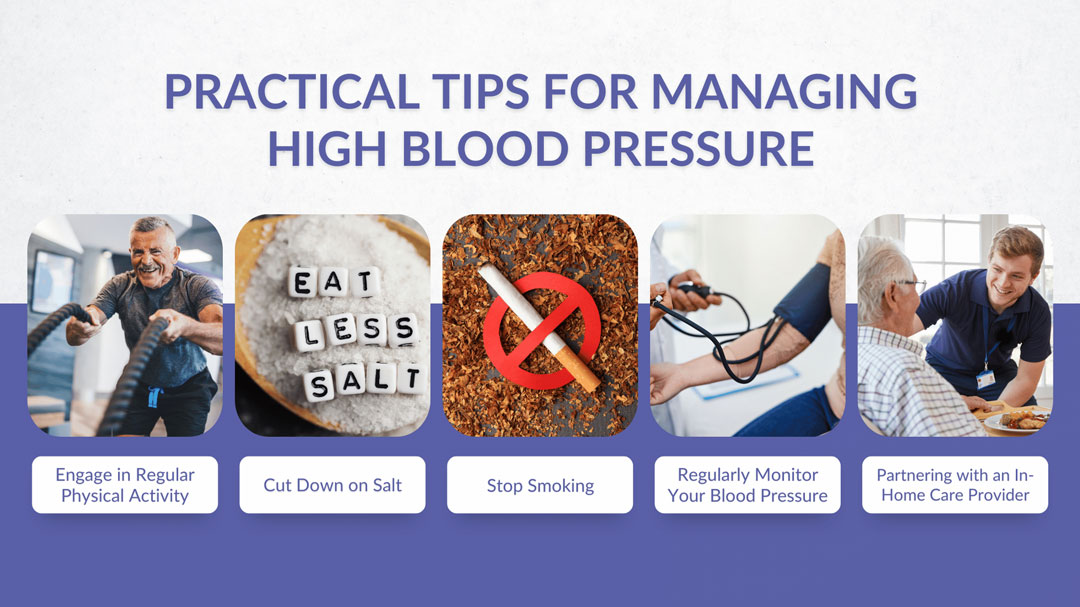Heart Health: Tips for Managing Hypertension

Your heart is vital in maintaining your overall health, particularly as you age. A significant threat to heart health is high blood pressure or hypertension. Hypertension occurs when your blood exerts excessive force against the walls of your blood vessels, which can damage your arteries over time. This condition can lead to serious health problems such as heart attacks, strokes, heart disease, kidney issues, and even vision loss.
Many seniors are unaware that they have high blood pressure because it often has no obvious symptoms. Regular blood pressure checks are essential for diagnosis. Consistently high readings, specifically 130/80 or above, indicate hypertension. While medication can help manage blood pressure, lifestyle changes are equally important for keeping it under control.
Regular monitoring and proactive blood pressure management through medical and lifestyle interventions are crucial in maintaining heart health and preventing the severe consequences of hypertension.
Table of Contents
Understanding the Health Risks of Hypertension in Seniors

Hypertension poses significant health risks, especially for seniors. Here are some of the critical dangers associated with high blood pressure in older adults:
Heart Disease
High blood pressure can cause arteries to harden and thicken, which may lead to heart disease or heart failure. This increased strain on the heart can cause it to enlarge, making it less efficient at supplying the body with blood.
Stroke
Elevated blood pressure can lead to the bursting or blockage of blood vessels in the brain, resulting in a stroke. Strokes can cause long-term disability or even be fatal.
Kidney Damage
The kidneys are responsible for filtering waste from the blood, but high blood pressure can damage the blood vessels within them, compromising their function. This damage can lead to chronic kidney disease or kidney failure.
Vision Loss
Hypertension can harm the blood vessels in the eyes, leading to vision problems or blindness. This condition, known as hypertensive retinopathy, can develop without any noticeable symptoms.
Cognitive Decline
There is evidence suggesting that high blood pressure contributes to cognitive decline and the development of dementia in seniors. This can significantly affect daily life and overall well-being.
Understanding these risks highlights the critical need to manage hypertension through lifestyle changes and medical intervention.
What Causes Hypertension?

Hypertension occurs when blood pressure against the artery walls remains consistently elevated. Various factors contribute to this condition, including a high-sodium diet, lack of physical activity, overweight, smoking, excessive alcohol consumption, and chronic stress. Genetics and age also play significant roles. By understanding these causes, you can take proactive steps to manage your blood pressure effectively.
Monitoring your blood pressure throughout the day is essential to determine if it remains high or stays within your target range. Record your activities during each check, such as exercising, sleeping, or experiencing stress. Tracking these trends can help assess the effectiveness of your lifestyle changes. Share these records with your doctor for better guidance.
Practical Tips for Managing High Blood Pressure

Incorporating specific lifestyle changes into your daily routine can significantly improve your health and help manage hypertension. Here are some practical tips to keep your blood pressure in check:
Engage in Regular Physical Activity
Aim for a minimum of 30 minutes of moderate exercise five days a week. Mix up your workouts to stay engaged and motivated. Consider activities like walking, jogging with friends, biking, swimming, dancing, or joining a senior fitness program. Incorporate both cardio and strength training exercises to keep your body active and healthy.
Physical activity also helps with weight management, which is vital for lowering high blood pressure. Even shedding a few pounds can reduce the stress on your heart and blood vessels. Consult your doctor for tailored exercise and weight management advice.
Cut Down on Salt
High salt intake is a major contributor to elevated blood pressure. Try to limit your sodium consumption to 1,500 mg or less per day. Pay close attention to food labels and serving sizes. Processed and packaged foods usually have higher sodium content compared to fresh foods. Choose canned products labeled “no salt added,” “unsalted,” or “low sodium.”
Adopt a balanced diet that includes plenty of fresh or flash-frozen fruits and vegetables, lean meats, and whole grains. Use herbs, spices, and other salt-free seasonings to enhance the flavor of your meals.
Stop Smoking
Quitting smoking is challenging but highly beneficial for your health. Nicotine narrows your blood vessels, reducing blood flow and increasing the workload on your heart. It also raises the risk of plaque buildup in your arteries. Combined with high blood pressure, this greatly increases your risk of stroke or heart attack.
Regularly Monitor Your Blood Pressure
Keep track of your blood pressure throughout the day to ensure it stays within your target range. Record your activities during these checks, such as exercising, sleeping, or feeling stressed. Monitoring these patterns can help you determine the effectiveness of your lifestyle changes. Share your observations with your doctor to improve your management plan.
Partnering with an In-Home Care Provider
An in-home care provider can significantly help you manage your heart health. They can remind you to take your blood pressure medication, assist in creating and preparing a low-sodium diet, and encourage regular physical activity. Additionally, having a caregiver provides companionship and support as you navigate these lifestyle changes. Contact Always Best Care of Oakville at (647) 931-7778 to learn more and schedule your free consultation.





